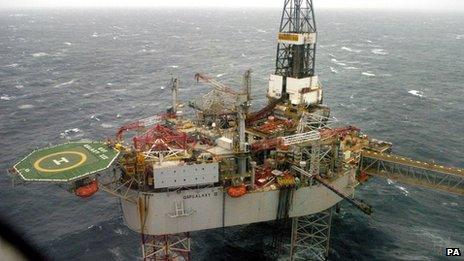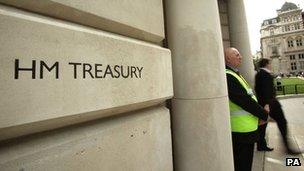Twists and turns in the offshore pipeline
- Published

The survey found North Sea investment at its highest for more than 30 years
After a dreadful end to last week, George Osborne starts this one with better news.
Britain's oil and gas industry is publishing its annual survey of activity and investment plans on the UK Continental Shelf, with figures showing it's in rude health.
Investment is at its highest for more than 30 years, and set to rise further. Companies have just under £100bn in their investment plans, of which £44bn is already committed and £30bn is more likely than not to go ahead.
Jobs are being created by the thousand. Drilling activity is rising. Tax revenues are rolling in.
They're not rolling in as fast as 2011: £7.3bn last year and £11.3bn the year before. The survey points to a further dip, to an estimated £6.7bn during this year.
Downward trend
That's because the news on production looks very different to that on investment. Last decade, production was on a trend 6.5% annual decline. That trend line veered downwards over the past two years, with output falling 30%.
That's not due to volatile prices for gas or Brent crude. They've been relatively stable.
It has to do with the industry pulling back on investment, and shutting down units following the Deepwater Horizon calamity in the Gulf of Mexico in 2010, so that engineers could work on "asset integrity".
Some unplanned shutdowns are because kit is showing its age. The Elgin field and Seal pipeline had to be shut down for the second quarter of last year.
The taps were turned off earlier this year on Cormorant Alpha, due to an oil leak into a platform leg, which "curtailed production" in 27 neighbouring fields linked to it.
Impetuous jolt
The independence campaign in Scotland can take two lessons from this.
One is that the industry is showing no sign of concern about its investments if the UK splits. The other is a reminder of the volatility of production and tax revenue as a basis for Scotland's finances.

The oil industry persuaded the chancellor and the Treasury to think again on tax breaks
Such volatility is more easily absorbed in a budget roughly 10 times the size.
But Monday's report had an even clearer message for the Treasury.
Oil and Gas UK, representing the sector and carrying out this survey, links the sharp drop in production over the past couple of years to tax raids by Gordon Brown last decade and by George Osborne in 2011 - an impetuous and unexpected jolt to the industry that badly dented relations, and marked Britain out as one of the world's more unpredictable fiscal regimes.
The Labour administration takes more of the blame - "while the oil price nearly trebled between 2002 and 2008, investment increased by less than 50%," says the report.
With a three-year development lag, it was the low level of project approvals in 2008 and 2009 that fed into those sharp declines on 2011 and 2012.
Tax cheques
Deploying its formidable lobbying power, the industry has persuaded Osborne and the Treasury to think again, with tax breaks targeted at early years of production from new and pricey fields.
Osborne has also had part of his 20 March budget pre-announced, with a pledge to provide certainty on tax breaks for an estimated £35bn of decommissioning that's needed in coming decades.
Without clarity on that, it's been hard to attract newcomers. With clarity expected, investors are pouring billions into UK waters, buying reserves and thus releasing capital for smaller explorers to keep drilling.
So this is one report where ministers are led by the nose through the implications of their tax decisions on output and tax revenue.
Other business lobby groups can make claims of the impact of tax on output. The hydrocarbon industry can demonstrate it, and reward ministers with huge tax cheques and job announcements when they do what the industry wants, even if it takes until 2017 to get there.
They pile the lobbying pressure on with warnings that incentives for investment need to keep coming, and under time pressure, if ageing equipment is to be used to squeeze more out of emptying reservoirs.
The North Sea is no place to mothball corroding hardware. The message is: incentivise us to use it, or you lose tax revenue from production, and depend more on foreign sources of energy.
Roll out the barrel
The case is made by reference to rising costs. Last year, the rental cost of a jack-up drilling rig went up 66%. With demand for their services around the world, that's an eye-watering $166,000 per day.
Operating costs rose 10% last year, to £7.7bn. They're expected to rise to £8.5bn this year.
That spend is good news for those supplying the industry, including oil workers and their wages. But it underlines how expensive the UK is. The cost of producing a barrel of oil 10 years ago was under £2, in 2012 money.
Last year, it hit £13.50. Next year, it is expected to peak at £14.50. In some northern North Sea fields, it can be more than twice as much.
That high cost means vulnerability if or when oil prices dip, and other parts of the world can offer more attractive returns.
But it's worth stressing: these are good times for Britain's oil industry and north east Scotland in particular - particularly when set in the context of economic malaise across the rest of the economy.
You can also comment or follow Douglas Fraser on Twitter: @BBCDouglsFraser